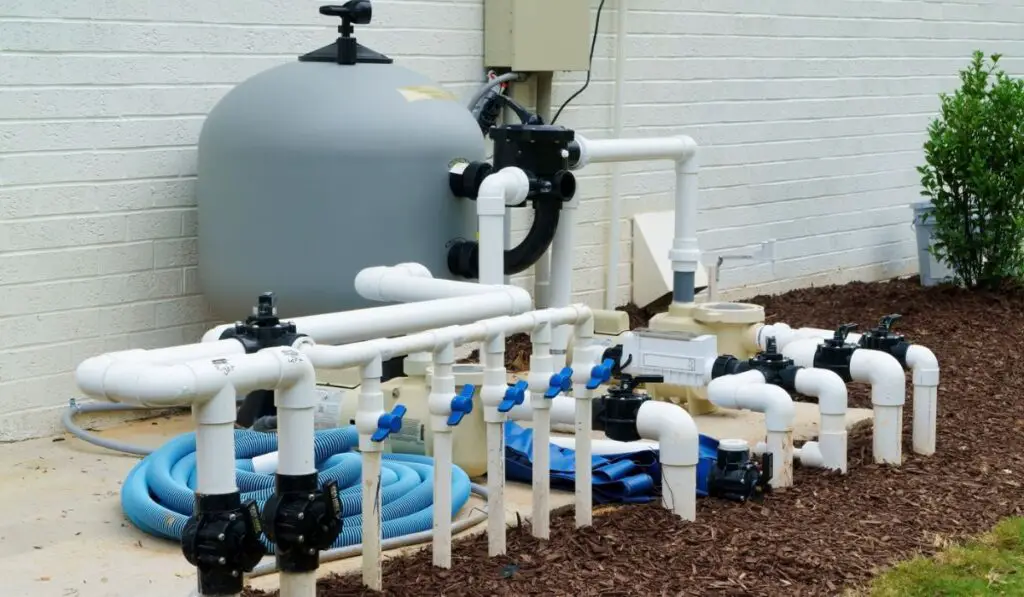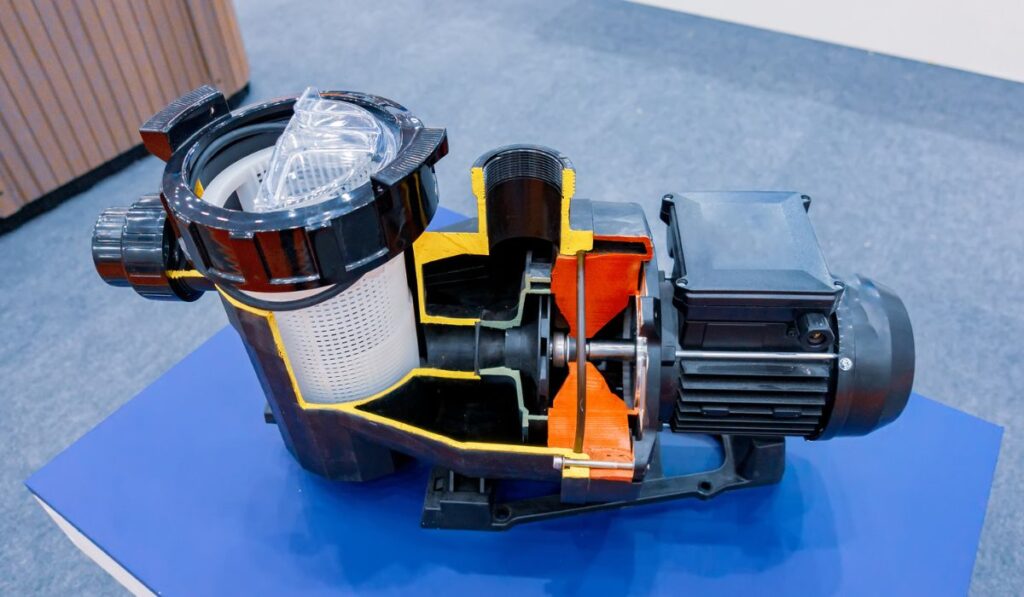If you don’t fix or replace a pool pump that keeps shutting off automatically, your pool will quickly become overrun with algae and littered with leaves and other debris. In fact, an uncirculated pool is a serious health hazard that can sometimes even lead to citations. So, why is your pump shutting off, and what can you do about it?
Your pool pump may be shutting off irregularly because of voltage issues or clogging. Try cleaning the basket, priming the pump, and checking the breaker to fix the issue. If the problem still persists, then it might be time for a new pump. Pool pumps last 6-8 years typically.
There are various other reasons why your pool pump might shut off randomly — a behavior commonly known as “pump tripping.” Let’s look at the possible reasons behind this issue, what you can do to fix it, how long a pool pump usually lasts, and when you should replace one.
What Causes a Pool Pump to Shut Off Unexpectedly?

Your pool pump might be overheating, functioning at the wrong voltage, or simply failing to meet the high energy demand. Let’s take a more in-depth look at why your pool pump might be shutting off randomly:
Voltage Issues
All pool pumps are equipped with motors that require electricity to function. Most pump motors operate at 115 or 230 volts, and they’ll stop working if they receive incorrect voltages.
If you recently installed your pool or replaced your pool pump, you might have wired it incorrectly, which can result in voltage issues. If you turn on your pump and it keeps tripping after five to ten seconds of operation, then an incorrect voltage is the most likely culprit.
Your pool pump might also stop working because of a bad capacitor or loose wires. A capacitor regulates the electricity that a pump receives and usually goes bad with age. If this happens, your only hope of fixing the pump is to replace the old capacitor with a new one.
Impeller Obstructions
A pool pump has a spinning impeller that sucks water through your pool’s filter. If the impeller is obstructed, the pump motor will produce a humming noise and then might shut itself off.
There are a lot of things that can hinder the impeller’s movement, such as leaves, rocks, dead animals, and even articles of clothing.
Overheating
For safety reasons, most pool pumps shut off automatically when they start to overheat. This function is controlled by thermal overload switches, but a faulty mechanism can cause your pool pump to shut off randomly.
However, it’s also possible that you have an overheating pump — in that case, it’s better to hire a technician to solve the problem.
High Energy Demand
During heatwaves, your pool pump might shut off simply because it’s unable to pull the required electricity from the grid. Your local supplier might experience power drops if a large number of people are running swimming pool pumps, air conditioning units, and several other devices all at the same time.
You can easily call your local power supplier and confirm whether there’s a power drop in your neighborhood.
How Do You Fix a Pool Pump That Keeps Shutting Off?
Fixing your pool pump immediately can help prevent unhealthy bacteria, mosquitos, algae, and other pests from contaminating it. Here are a few ways you can repair a pool pump that keeps shutting off:
Unclog the Filter Basket
- Switch off the circuit breaker and pump to stop the flow of water.
- Remove the pump’s lid and basket.
- Use your hand to remove the debris clogging the basket.
- If necessary, unscrew the bolts connecting the motor to the pump housing and then remove the leftover debris stuck in the impeller – your probably won’t need to do this unless the basket was broken, allowing material to clog the impeller.
- Rotate the impeller manually to ensure unobstructed movement.
- Secure the pump’s housing to its motor, replace the basket, seal the lid, and then prime the pump.
Replace a Bad Capacitor
- Switch off the pump and circuit breaker to make sure you don’t get an electric shock.
- Lift the cover of the capacitor from the side or back of the pump to access the capacitor.
- Disconnect the two wires attached to the capacitor and then unscrew the retaining bolts.
- Install the new capacitor and screw in the retaining bolts.
- Connect the old wires to the new capacitor and then seal the lid.
- Switch on the pump and circuit breaker and check whether the problem still persists.
Prime Your Pump
- Turn off the pump.
- Fill the pump’s basket with water until it reaches the top of the suction inlet.
- Turn on your pool pump.
- Open the filter’s relief valve until the water flows out.
- Seal the valve to finish priming your pump.
Replace an Old Motor
- Switch off the circuit breaker and pump.
- Unscrew the pump housing’s bolts, disconnect the motor, and then use a screwdriver to remove the impeller.
- Disconnect the wires from the old motor and attach them to the new one.
- Connect the new motor to the pump housing and impeller.
- Prime the pump once you’ve successfully completed the installation.
Replace a Faulty Timer
- Switch off the pump and circuit breaker.
- Disconnect the wires connecting the faulty timer to the breaker and pump.
- Unscrew the retaining bolts on the timer’s box.
- Install the new timer and connect the old wires to its LOAD and LINE nodes.
- Connect the breaker’s wires to the timer.
- Set the new timer to the current time and move the timer trippers to the desired OFF and ON times.
Check the Breaker
- Switch off the circuit breaker.
- Make sure the pump isn’t overheating, and then check the amperage of the breaker.
- If your breaker is receiving too many amps, install a new breaker or connect the pump’s wire to a steadier breaker.
How Long Do Pool Pumps Usually Last?
A high-quality, well-maintained pool pump usually lasts around eight to 12 years. However, if you’ve missed out on several critical pool services, you can expect the pump to have a shorter life.
If your pool pump is more than five years old and is becoming riddled with more and more problems, it’s best to purchase a new one. The latest pumps are more energy-efficient and longer-lasting, so you’ll get those added benefits as well.
How Do You Know When You Need a New Pool Pump?

If your swimming pool gets dirty every other day, it might be time to get a new pool pump. There are several signs of a faulty pool pump, and some of them usually indicate the need for a replacement:
Rumbling Sounds
A dislodged or loosened pump motor vibrates excessively and produces loud, rumbling sounds. These vibrations cause the pump to bump and hit the pool’s surface, damaging it irrevocably.
Thankfully, the problem is easy to fix, as long as you call a pool repair service immediately. However, if you wait too long, the pump will develop cracks, after which you can do nothing but replace it with a new one.
Screeching or Grinding Sounds
During the early stages, a screeching or grinding sound usually indicates the need for new bearings. Old and worn-out bearings can overheat the motor and damage the pump’s windings, so it’s important to replace them as soon as possible.
Although the bearings themselves are inexpensive, the replacement process involves opening up the entire pump and then installing the new bearings. So, instead of going through all this hassle, it’s just better and easier to buy a new pool pump. One of our favorites is the Hayward Super Pump (on Amazon).
A screeching or grinding sound can also mean a leaking pump seal, which you’ll need to replace as well. However, this is a fairly complex operation, so it’s better to hire a professional to help you out.
Spitting Water and Blowing Bubbles
If you notice a constant stream of bubbles in your pool or feel a bit of sucking action when you’re in the water, then your pump might have a potential air leak.
It’s essential to get this fixed immediately, as an air leak means your pump isn’t filtering and cleaning the water properly. If left neglected, this will result not only in cloudy and dirty pool water but serious health hazards as well.
